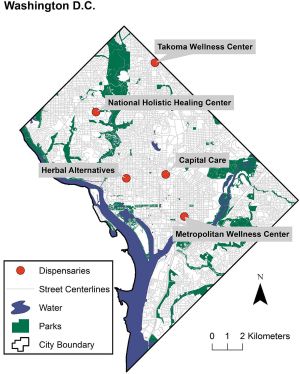SCJ Team Studies Crime Near DC's Medical Marijuana Dispensaries
ALBANY, N.Y. (March 27, 2019) — Opening a medical marijuana dispensary does not appear to increase criminal activity in surrounding area, according to a new study by two PhD students from the School of Criminal Justice (SCJ) and an assistant professor from the University of Texas at Dallas.
 |
|
The study looked at criminal activity surrounding Washington DC's five medical marijuana dispensaries. |
The researchers analyzed street-level geocoded crime data before and after the opening of five medical marijuana dispensaries (MMDs) in Washington D.C. The study, “Cannabis in the Capital: Exploring the spatial association between medical marijuana dispensaries and crime,” was published March 1 in the Journal of Crime and Justice.
The study found only one of the five dispensaries had an increase in neighborhood crime after opening, but that area was already seeing an uptick in larcenies before the MMD opened. The study concludes that the “preponderance of evidence in Washington D.C. shows that medicinal marijuana dispensaries have no immediate criminogenic effect on the surrounding area.”
The lead author is William J. Zakrzewski Jr., a PhD student in the SCJ whose research focuses on cross-national theory testing and application, drugs and drug courts, and green criminology. Zakrzewski received his master’s in criminal justice from Radford University in Virginia.
Co-authors are Andrew P. Wheeler, an assistant professor of criminology at UTexas Dallas who earned his doctorate in criminal justice from UAlbany’s SCJ; and Andrew J. Thompson, a PhD student in SCJ. Wheeler’s research focuses on the spatial analysis of crime and evaluation of police interventions, while Thompson focuses on public opinion of crime, survey methodology, group threat and social control.
The authors conclude that while the MMDs studied showed little impact on crime, further study is needed due to a small sample size and the study of a single city. Future research should also examine the influence of recreational marijuana dispensaries, the study states.
![]() For more news, subscribe to UAlbany's RSS headline feeds
For more news, subscribe to UAlbany's RSS headline feeds
A comprehensive public research university, the University at Albany-SUNY offers more than 120 undergraduate majors and minors and 125 master's, doctoral and graduate certificate programs. UAlbany is a leader among all New York State colleges and universities in such diverse fields as atmospheric and environmental sciences, business, education, public health,health sciences, criminal justice, emergency preparedness, engineering and applied sciences, informatics, public administration, social welfare and sociology, taught by an extensive roster of faculty experts. It also offers expanded academic and research opportunities for students through an affiliation with Albany Law School. With a curriculum enhanced by 600 study-abroad opportunities, UAlbany launches great careers.


